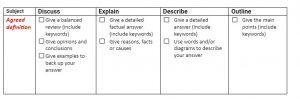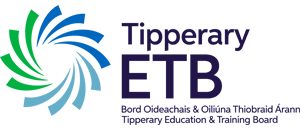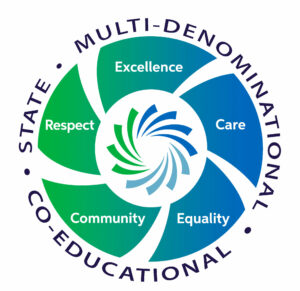As part of your programme at Coláiste Mhuire Co-Ed you will learn how to learn. Some people call this study skills, others call it academic monitoring but the essence of what it involves is learning how to learn. On this page of the school website we try to distill what we do throughout your time in the school and provide useful links to other pages that may of be interest to you in this regard.
Target Setting
At Coláiste Mhuire all teachers do regular, formal testing (outside of bi-annual formally reported house exams). This is a co-ordinated approach to academic mointoring and the results are recorded on our compass system. We use these results to track progress. Students are also required to note their results in their journals. A strategy to improve your grades is set a target grade for each test. We encorage students to write their target grade in pencil and then to write the achieved grade in pen. Students are then asked to reflect on their own progress, ask teachers how they can improve and identify their own strenghts and weakness.
To learn more about target grades click here
Key Exam Words
As part of our ongoing work to provide for Excellence in Education the DEIS team has rolled out a key exam word initiative to each student. We have chosen the most common exam words, broken them down using Department of Education Guidelines and have agreed to request for consistency of use across subjects.

Thanks to Mr Stapleton for preparing this video for parents which explains this process and may be a support to you and your children.
Mind mapping
All second year students are taught how to make a mind map. This is then used in other subjects. Students are encouraged to create mind maps as an aid to revision. For more information on how to create a mind map go to Tony Buzans free interactive course.
Read Review and Revise
The SQ3R is a very useful technique. We teach a slightly amended version of this. Students are taught to
- Read the material
- As a review technique to write down questions
- They then close the book and see if they can answer the questions
- They then go back to the book to answer “unanswered questions”
- They revise these questions several times until all material is known.
Exam Timetable
Our student journal has 2 blank timetables for students to use to prepare revision timetables. Students are encouraged to use these and to amend them as necessary.
Evening Study
We offer supervised evening study to students for a very small fee. This provides students with a quiet environment to get homework and study done before going home every evening. Students in exam years and encouraged to do homework in study time and to do a separate session of study after their evening meal and some exercise.
How best to prepare for an exam
- Have a revision timetable – start planning well before exams begin. Have realistic goals and include breaks – make sure to get some fresh air or have the window open while studying where possible.
- Make your books, notes and essays user-friendly. Use headings, highlighting and revision cards, and get tips on other revision techniques from teachers and friends with experience of exams.
- Everyone revises differently. Find out which routine suits you the best – alone or with a friend or parent/carer; early morning or late at night; short, sharp bursts or longer sessions; with music or without noise.
- Ask for help from your teacher, parent/carer or a friend if there are things you don’t understand.
- Prioritise! If you think there’s too much work, and not enough time left to do it in, write down everything you need to do, and sort it into order of priority. You can then work out what action you need to take for each task, and work your way through your list. You need to take into account which topics are the most important or compulsory, which you already know best, and which you have enough information on.
- Get plenty of Sleep – your body needs time to process all the information you are taking in and re-energise, so that it is ready for the day ahead.
- Eat Healthy – avoid processed and fast food as much as possible. Try eating foods high in omega 3 as this is great brain food.
- Avoid Caffeine (e.g. coffee, caffeine tablets, Red Bull) and high sugared snacks, as these give you a short lift before making you crash and burn. They can make you feel sick and can interfere with your sleep and therefore your ability to concentrate. You actually study better with regular breaks, getting lots of sleep and from exercising.
- Avoid Cramming the night before an exam, make sure you get a good night sleep and wake up earlier if you want to read over your notes rather than staying up late.
- Make sure you give yourself time each day to relax, taking breaks to do something you enjoy – watch TV, listen to music, read a book or go out for a walk.
On the day of the exam:
- Have a good breakfast – as you need fuel to concentrate!
- Make sure you know when the exam is being held and what time it starts. Give yourself plenty of time to get there.
- Take all the equipment you need for each exam, including extra pens and pencils. Also take a bottle of water, a snack and tissues.
- Go to the toilet beforehand!
- Avoid people who are stressing out, find a quiet corner and read over your notes.
- If you feel really anxious, breathe slowly and deeply while waiting for the exam to start.
Pace yourself:
- Read the instructions before starting the exam.
- Ask the teacher or exam supervisor if anything is unclear.
- Read through all the questions before starting writing, and make sure you are clear how many questions you are required to answer. Read front and back of the exam sheet!!!!
- If there is a choice, start by answering the question you feel you can answer best.
- If you are stuck on a question, go on to the next. You can always come back to it later. If you are really stuck, try to have an intelligent guess anyway. Never leave a blank page if at all possible!!!!
- Leave time to read through and check your answers before the exam finishes.
- After the exam – Don’t go through the answers afterwards with your friends if it is only going to make you more worried and you can’t change it now.



